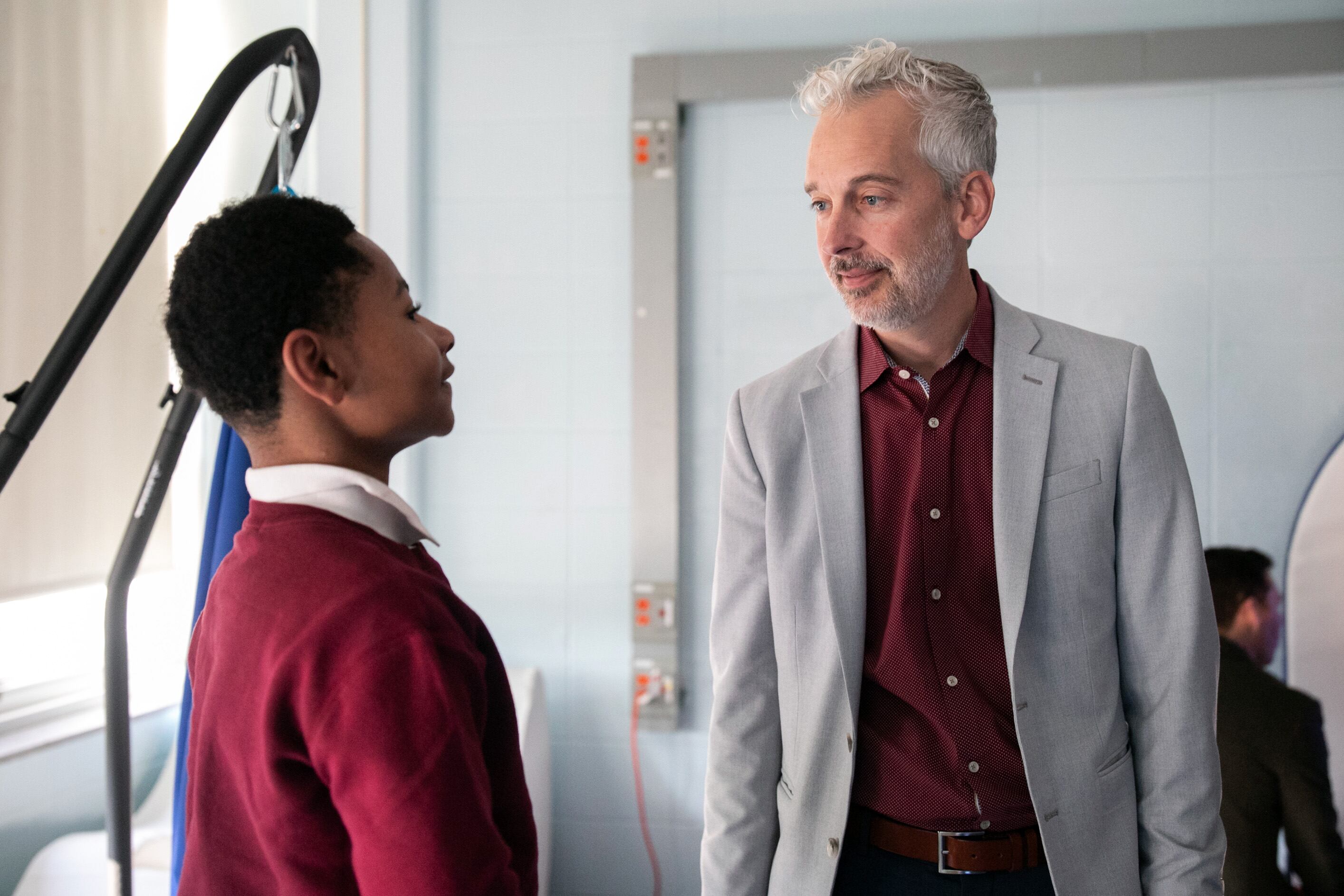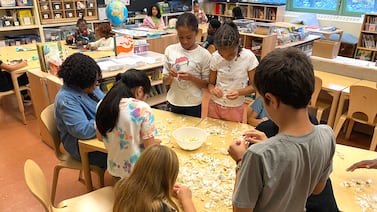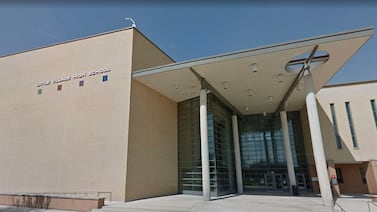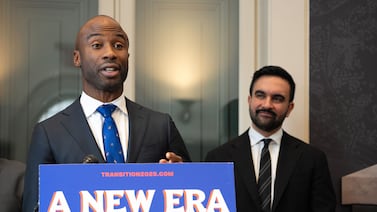Sign up for Chalkbeat Chicago’s free daily newsletter to keep up with the latest news on Chicago Public Schools.
On a chilly December morning, Joshua Long, Chief of Chicago Public Schools’ Office for Students with Disabilities, went to South Shore Fine Arts Academy to watch a few students play in the school’s newest sensory classroom.
The classroom was a partnership between Chicago Public Schools and the Special Children’s Charities to bring sensory rooms to 22 schools around the city; the charity donated $1.3 million for the project. Throughout the morning, Long watched as students played with therapeutic equipment that can help prevent students from becoming overwhelmed or mitigate the effects of feeling overwhelmed.
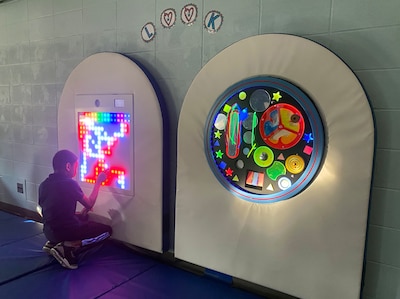
It’s been a year since Long became the head of the district’s special education department. He has worked in the district for over 20 years, beginning as a speech pathologist and then becoming a principal at Southside Occupational Academy High School, a school for students with disabilities. Now as chief, he helps shape the policies that impact students with disabilities on a daily basis.
Long said this past year has been exciting, a bit of a blur, and has entailed a ton of work, but “I’m extremely motivated to keep doing the job that we’re doing and just trying to make things better for our kids.”
Before Long took on this role, the district’s disabilities office faced significant challenges. During the early days of the pandemic, schools struggled to provide new Individualized Education Programs to students and to update existing plans. The district has also struggled to transport students with disabilities to schools, and advocates have filed several complaints with the Illinois State Board of Education for lack of busing and long transportation times. In 2023, the state found that the district’s restraint and time-out practices were putting students at risk.
Speaking to Chalkbeat Chicago, Long reflected on the past year, shared what he’s working on, and opened up about his ideas for the future even as Chicago Public Schools even with tight budgets.
This interview has been edited for length and clarity.
How has the Office for Students with Disabilities worked with parents throughout the year?
A lot of those structures were already in place. We have a weekly consultation with the state board of education. We have a Family Advisory Board. We have a joint stakeholder meeting with advocates, we have another meeting with the unions, and we have the board of education special education advisory committee. The way that I approach all of those groups is that it’s an opportunity to let people know what we’re doing. Being very candid and straightforward about the initiatives that we are embarking on, being honest about the struggles that we’re seeing, and engaging everyone as partners in the work and to ask for their ideas.
In Chicago Public Schools, and even nationally, there has been an increase in the number of students who have been identified as having disabilities. What has the office been doing to address these needs? What are the growing pains?
We’re over 60,000 students with disabilities, which includes students with 504 plans and students with IEPs. Much like across the nation, especially after COVID, we’re seeing a lot of students identified with disabilities. We have to consider the resources that students with disabilities need in order to make the educational gains that we expect. We’ve talked a lot about budgetary issues that we’re facing here in the city. We also have staffing shortages with our paraprofessionals, special education teachers, and related service providers. As the number of students has continued to grow, we need more people to service them.
Since there are staffing shortages, what is your office doing to fill those positions?
We work with our talent office and have a number of pipeline programs. For example, we have one that promotes current paraprofessionals who are interested in becoming special education teachers. We work with them to obtain bachelor’s and/or master’s degrees and to become teachers. We try to be creative and think about how we promote from within. What’s great about paraprofessionals is they have the experiential knowledge of working with students with disabilities. Take that information, and couple that with classes and evidence-based approaches on how to educate students with disabilities. It’s a win-win.
Across Illinois and in Chicago Public Schools, chronic absenteeism is high. The rate of chronically absent students is even higher among students with disabilities. What have you all been doing to get students back into the classroom?
One thing that I noticed is that we’re really good as a district in talking about the educational gains. We’ve made some impressive gains with students in both reading and math just this past year. But we didn’t talk about what those gains looked like for students with disabilities. As we’ve reflected on those academic gains in addition to the chronic absenteeism, the numbers are not great.
I can point to the district’s new five-year strategic plan. You’ll notice there is a strategy for students with disabilities. The concept that we’ve been using to guide our growth is a transformative approach called “rightful presence.” This approach moves beyond traditional practices of inclusion to really focus on dismantling systemic inequities on behalf of students with disabilities. So students have a true sense of belonging in all school environments. We believe that we will have the focus that we need to build out those instructional practices that all students need to succeed and then to start really seeing those academic gains and those improvements in chronic absenteeism.
During the pandemic, there was a delay in identifying students with disabilities and updating current students’ Individualized Education Programs. What has the Office for Students with Disabilities been doing to ensure that students are identified, have an updated IEP, and receive the services that they need?
I’ll be completely honest, we have systemic issues. Anytime we get a state complaint or a complaint from an advocate, I see that as an opportunity to really look at what they’re raising and to see if there is something that we’re missing. With those delays, we did build out new practices. We’ve built out new training. We’re monitoring deadlines and looking at compliance. When you start thinking about over 600 schools, close to 2,000 people just on my team, not to mention the special education teachers, paraprofessionals, and case managers, all of those individuals are focused on students with disabilities. It’s a lot of space to be in to establish consistency. It’s important to really think about not only are we able to establish our practices, but how do we ensure that they’re actually happening with fidelity on behalf of our students.
Some students with disabilities can go to public schools up to the age of 22. What has the district done or instructed schools to do to help students transition to adulthood?
Within our five-year strategic plan, there is a specific call to increase the number of students with disabilities in Career and Technical Education, International Baccalaureate programs, and Advanced Placement courses. We are focused on increasing those opportunities. We have college programs that we’ve been working on with the city colleges, and we are expanding those. We also are looking to increase awareness of the lack of funding for programs for adults with disabilities across the state of Illinois.
There are some concerns about the Chicago Public Schools budget in the future as the district faces budget deficits. What are you concerned about when it comes to the budget?
What I can tell you is that coming into this role, I was faced with the reality that we had budgetary issues. But CEO Pedro Martinez and Chief Education Officer Bogdana Chkoumbova have found the money to support students with disabilities because they understand that not only is this important, it’s a legally mandated service. They continue to pour millions of dollars into allowing us to build out the programming that we think students need. I opened 62 new cluster programs this year. I didn’t know that the district had money for that, but that’s what we needed to do for students with disabilities. There wasn’t a question of how do you do less or how do you do something different that would cost less. It was, “OK, if this is what you need, then we need to figure it out”.
Samantha Smylie is the state education reporter for Chalkbeat Chicago, covering school districts across the state, legislation, special education, and the state board of education. Contact Samantha at ssmylie@chalkbeat.org.

